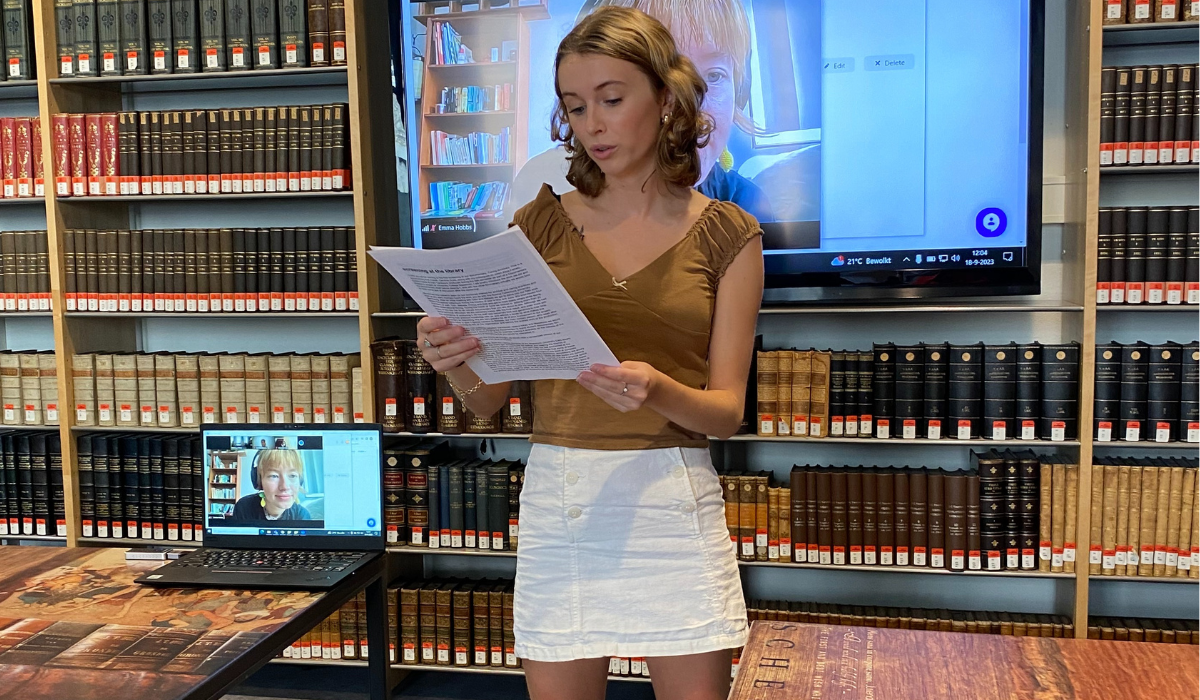
Special Collections Discovery
Caroline Guidi (21), a third-year student at UCM, presented the documentary to the audience. She said the student team was fascinated by the Special Collections depot from the start.
“One of us worked at the library and heard about the Special Collections, so we did a tour with other students (to visit the depot), and we thought, wow – this is incredible. Hundreds of students come to the library every day, not knowing that right underneath us there is this amazing place.”
As part of their project, the students were tasked with making a short research film. According to Guidi, they were searching for an interesting topic when they first visited the Special Collections depot.
“When we saw the depot, we were intrigued by the idea of archival studies, but also the actual space. And it was something that combined all of our different interests and specialties as a team.”
For weeks, the students closely observed the Special Collections staff at work and conducted extensive interviews about their work processes and the meticulous management of an archive on a daily basis.
Promoting Accessibility
During their investigation, the students recognised that it is not only important to preserve archives but also to make these extraordinary books, documents, and pictures accessible for teaching, research, and the wider public.
“The people who work in this archive know it is one of their most important duties – to involve citizens and give the public the opportunity to see and use these archives,” said Guidi.
The Special Collections team regularly organises citizen science programmes to actively involve members of the public and to improve accessibility to their collections. Additionally, students, researchers, and the general public have the opportunity to arrange visits to the Special Collections depot, providing firsthand access to these remarkable books.
Treasures of the Library
The library houses extraordinary Special Collections, including the so-called ‘Jesuits Library’, UM’s most important and extensive special collection, comprising some 250,000 volumes mainly in the fields of philosophy, history, anatomy, literature, theology, law, and social sciences. It boasts rarities such as a handwritten New Testament from 1471, a prayer book owned by Louis Napoleon, and several profusely illustrated books by famous Jesuit Athanasius Kircher. Furthermore, an important special collection consists of 56 richly illustrated children’s books from the first half of the 20th century. Among these are first editions of fairy tale books by renowned authors such as the Brothers Grimm.
An unexpected Sensory Journey
Visiting and filming within the depot provided an experience quite distinct from what the students had anticipated. Guidi described it as a sensory journey – the aroma of centuries-old books, the tactile sensation and gentle rustling of pages under one’s fingers.
“I was surprised that we were granted access to such ancient and valuable books. We could actually touch and feel the books. You have these highly valuable books, and then you invite people in and let them touch them. That is truly remarkable,” she said.
Contact us
Maastricht University Library stimulates, supports and facilitates the use of UM’s Special Collections and the thoughtful integration of digital technology to advance education and research. Think about how using these books can add value to some of your courses. If you want to know more about how we can support you, contact curator Odin Essers via Ask your librarian. Follow the Special Collections on social media: Maastricht University Special Collections (@specialcollectionsumlibrary) | Instagram and Special Collections – Maastricht University Library | Maastricht | Facebook

0 Comments